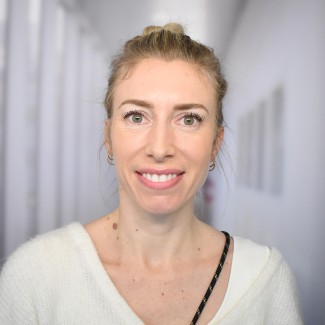
VILLAIN Marie
Title: MCU
Function: PI
Affiliated entities Sorbonne Université, APHP
Biography
After studying speech therapy in Paris (Sorbonne University), she completed a Master 2 in Research and Medical Engineering. These studies led her to carry out research at the Institut des Neurosciences Intégratives de Bordeaux (INCIA CNRS 5287) where she obtained a PhD in Neurosciences in 2016 under the supervision of Joel Swendsen (DR CNRS) and Igor Sibon (PUPH, University of Bordeaux).
His PhD focused on post-stroke depression with a daily living approach based on methods of sampling experiments on smartphone. She also used voice signal processing to characterize changes occurring within months of brain injury. From 2017 onwards, she developed a clinical translational activity in the field of neurology. His work during this period focused on the development and validation of innovative methodologies for the assessment of cognitive disorders following acquired brain injury, the recovery of language disorders and the development of new approaches to rehabilitation. She completed a post-doctorate within the PICNIC “Neuropsychology and Functional Neuroimaging” team at Paris Brain Institute in Paris under the supervision of Lionel Naccache (PUPH) and Jean-Julien Aucouturier (DR CNRS, Institut FEMTO-ST in Besançon). Her work focused on prosodic perception and metacognition. In this context, she applied methodologies from signal processing and psychophysics to better understand and characterize pathological mechanisms of voice perception. Thematic mobility, scientific productivity and leadership
These research experiences in cognitive neuroscience, with interdisciplinary contributions in both neurology/rehabilitative medicine and language sciences, have enabled him to mobilize a variety of approaches to address issues related to psychiatric manifestations and cognitive impairment following acquired brain injury.
Research
His research interests include mood disorders and metacognition after a cerebral stroke, assessment and management of acalculia, and prosody. They are at the intersection of cognitive neuroscience, psychiatry, neurology and language science. Fundamentally, they explore the cognitive and brain processes underlying the production and perception of prosody and digital cognition. From a methodological point of view, they invoke innovative methods of psychometry, experimental paradigms in single cases and, more recently, psychophysics.
- Adl Zarrabi, A., Jeulin, M., Bardet, P., Commere, P., Naccache, L., Aucouturier, J.J., Ponsot, E., Villain, M. (2024) A simple psychophysical procedure to assess impairments of speech prosody perception in right-hemisphere stroke. Scientific Reports. 14, 15194. https://doi.org/10.1038/s41598-024-64295-y
- Arheix-Parras, S., Du Puy De Goyne, M., Franco, J., Villain, M., Glize, B., Python, G. (2024) Transcranial magnetic stimulation to improve aphasia following a right hemispheric stroke : a Single Case Experimental Design. Annals of Physical and Rehabilitation Medicine. https://doi.org/10.1016/j.rehab.2024.101858
- Lemanissier, M., Riboulot, C., Weill-Chounlamountry, A., Dehollain, C., Pradat-Diehl, P., Bayen, E., Villain, M. (2023) Benefits of a targeted rehabilitation of number transcoding in secondary acalculia : A single-case experimental design. International Journal of Language and Communication Disorders. 59(1), 255–275. https://doi.org/10.1111/1460-6984.12942
- Balcerac, A., Weill-Chounlamountry, A., Coindreau, V., Pradat-Diehl, P., Bayen, E., Pichon, B., Mathon, B., Villain, M. (2022) Language improvement characteristics post-cranioplasty: A single case study. Annals of Physical and Rehabilitation Medicine 65(3) :101590 https://doi.org/10. 1016/j.rehab.2021.101590
- Benedetti, V., Weill-Chounlamountry, A., Pradat-Diehl, P., Villain, M. (2022) Assessment tools and rehabilitation treatments for aprosodia following acquired brain injury : A scoping review. International Journal of Language and Communication Disorders.. 57(3) :474-496 https://doi.org/10.1111/1460-6984.12692
- Villain, M., Sibon, I., Renou, P., Poli, M., Swendsen, J. (2021) Depression and routinization following stroke. Revue Neurologique, 177(8) :964-968. https://doi.org/10.1016/j.neurol.2020.08.012
- Glize, B., Villain, M., Richert, L., Vellay, M., de Gabory, I., Mazaux, J., Dehail, P., Sibon, I., Laganaro, M., Joseph, PA. (2017) Language features in the acute phase of poststroke severe aphasia could predict the outcome. European Journal of Physical and Rehabilitation Medicine, 53(2) :249-255. https://doi.org/10.23736/S1973-9087.16.04255-6
- Villain, M., Sibon, I., Renou, P., Poli, M., Swendsen, J. (2017) Very early social support follo- wing mild stroke is associated with emotional and behavioral outcomes three months later. Clinical Rehabilitation, 31(1) :135-141. https://doi.org/10.1177/0269215515623600
- Villain, M., Cosin, C., Glize, B., Berthoz, S., Swendsen, J., Sibon, I., Mayo, W. (2016). Affective prosody and depression after stroke. Stroke, 47 :2397–2400. https://doi.org/10.1161/STROKEAHA.116.013852
- Villain, M., Tarabon-Prévost, C., Bayen, E., Robert, H., Bernard, B., Hurteaux, E., Pradat-Diehl, P. (2015) Ecological Assessment Battery for Numbers (EABN) for brain-damaged patients : Standar- dization and validity study. Annals of Physical and Rehabilitation Medicine, 58(5) :283-288. https://doi.org/10.1016/j.rehab.2015.03.002

